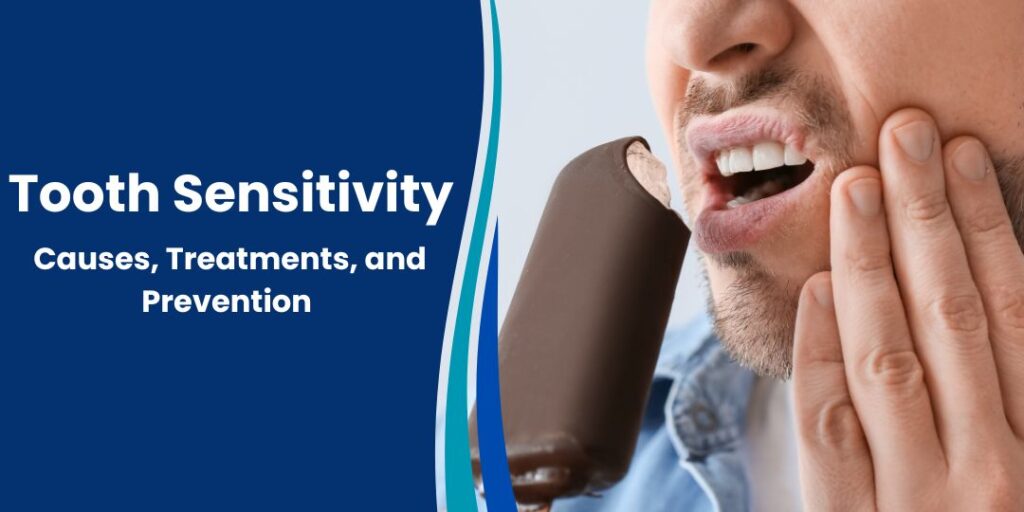
Do you ever feel a sudden, sharp pain in your teeth when enjoying your favorite ice cream or sipping on hot coffee? If yes, you’re not alone. Tooth sensitivity is a common dental issue that affects millions of people worldwide. While it can be temporary or chronic, ignoring it may lead to more serious dental concerns. Understanding what causes sensitivity, how it can be treated, and most importantly, how to prevent it, is key to maintaining long-term oral health.
Dr. Saswati Sahu, an experienced dental specialist at Smile Curve, a trusted Dental Clinic in Kharadi, provides valuable insights and effective solutions for managing tooth sensitivity.
What is Tooth Sensitivity?
Tooth sensitivity, also known as dentin hypersensitivity, refers to discomfort or pain in the teeth as a response to certain stimuli like hot, cold, sweet, or acidic foods and beverages. The pain can be sharp, sudden, and sometimes unbearable.
This sensitivity occurs when the underlying layer of the tooth, called dentin, becomes exposed due to worn enamel or gum recession. Dentin contains tiny tubules that connect to the nerve endings inside the tooth, and exposure to external stimuli triggers pain signals.
Common Causes of Tooth Sensitivity
Several factors can contribute to the development of sensitive teeth:
-
Enamel Erosion
Brushing too hard or using a hard-bristled toothbrush can gradually wear down the enamel, exposing the dentin underneath. -
Gum Recession
Gum disease or aggressive brushing may cause the gums to pull away from the teeth, exposing the root surfaces, which are not protected by enamel. -
Tooth Decay
Cavities, cracked teeth, or worn fillings can expose the sensitive parts of your teeth and lead to pain. -
Acidic Foods and Beverages
Frequent consumption of citrus fruits, soda, and wine can erode enamel and increase sensitivity. -
Bruxism (Teeth Grinding)
Grinding your teeth can wear down enamel and cause cracks, making the teeth more sensitive. -
Dental Procedures
Some people experience temporary sensitivity after procedures like teeth whitening, fillings, or root canals.
Treatment Options for Tooth Sensitivity
Fortunately, tooth sensitivity is treatable. A visit to a trusted Dental Clinic in Kharadi can help identify the root cause and recommend appropriate treatment. Common treatment options include:
-
Desensitizing Toothpaste
These toothpastes contain ingredients like potassium nitrate or stannous fluoride that help block pain signals from the tooth surface to the nerve. -
Fluoride Treatment
In-office fluoride applications can strengthen tooth enamel and reduce sensitivity. -
Dental Bonding or Sealants
If the sensitivity is due to exposed root surfaces, applying a bonding agent can protect the exposed areas and reduce discomfort. -
Gum Grafting
In cases of severe gum recession, a gum graft may be recommended to cover the exposed root and protect the tooth. -
Root Canal Therapy
For persistent sensitivity due to nerve damage or infection, root canal treatment may be the most effective solution. -
Mouthguards for Grinding
If you grind your teeth at night, wearing a custom-fitted mouthguard can prevent further enamel damage and alleviate sensitivity.
Preventing Tooth Sensitivity
While treatment options are available, prevention is always better. Here are some steps you can take to avoid developing tooth sensitivity:
-
Brush Gently
Use a soft-bristled toothbrush and avoid brushing aggressively. Brushing too hard can wear down enamel and cause gum recession. -
Use Fluoride Toothpaste
Fluoride helps strengthen enamel and protects against decay and sensitivity. -
Limit Acidic Foods and Drinks
Try to reduce the intake of citrus fruits, sodas, and other acidic foods. Rinse your mouth with water after consumption. -
Maintain Good Oral Hygiene
Brush twice a day, floss daily, and visit your dentist regularly to keep your teeth and gums healthy. -
Wear a Mouthguard
If you grind your teeth at night, a custom mouthguard can protect your teeth from damage. -
Visit Your Dentist Regularly
Regular dental checkups can help detect early signs of enamel erosion, gum disease, or decay before they worsen.
When to See a Dentist
If you’re dealing with ongoing or severe tooth sensitivity, it’s important not to ignore it. Persistent pain may be a sign of a more serious underlying issue such as tooth decay, a cracked tooth, or gum disease. Early diagnosis and treatment can save you from further complications and discomfort.
A professional evaluation at a Dental Clinic in Kharadi like Smile Curve can help identify the exact cause of your sensitivity and recommend a personalized treatment plan. Whether you need a simple desensitizing treatment or a more advanced procedure, expert care can make all the difference.
Tooth sensitivity can be more than just a nuisance—it can affect your quality of life by limiting your enjoyment of food and beverages. Thankfully, with the right care and preventive measures, it’s possible to manage and even eliminate this discomfort.
With years of experience and patient-focused care, Dr. Saswati Sahu at Smile Curve, a leading Dental Clinic in Kharadi, offers comprehensive solutions to help you achieve lasting relief from sensitive teeth. Don’t suffer in silence—take the first step towards a healthier, pain-free smile today!

